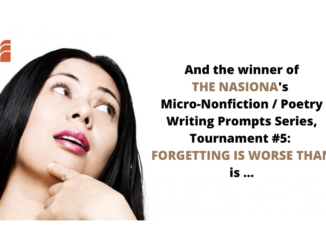
Bread was important. We never made bread, we bought it or worked for it. Bread came long, warm, and folded from the Italians up the street and down the block or the panaderia. Bread was something you ate con café con leche. Big yellow or white cuts of cubed cheese stuffed in between panaderia bread dipped in café or chocolate made our tiny mouths water. Mami would break the pan open with her small worn hands and pick the middle out like white cotton candy. It would melt in her hands while she rolled it into a ball that was hard and sturdy resembling the size of a jawbreaker before she popped it into her mouth or ours.
Bread was important. We bought bread with a plastic card with mami’s picture on it. Her hair looked short and frizzy. Her eyebrows bushy and close together, almost touching. Her small face fit perfectly into the small square space allotted on the card. The picture was in black and white and she was trying not to smile. Her lips pierced, almost giving way to embarrassment. A mug shot that aged her through the years before that card crumbled and the department of transitional assistance decided against the photo op.
We never made bread, we bought or worked for it. Mami made other things. She made alcapurrias, pasteles, sorullitos de queso, bacalaitos, mofongo, and tostones. Our bread we bought. Mami’s little worn hands were soldiers in a war. They saluted only to adobo, recao, sofrito, and sazon. Café con leche was her muse and arroz con gandules her trophy. Flan made everything and everyone in the house still. Mami’s hands’ magic powers would leave us chewing in silence.
Bread was important. We never had yeast; single-cell organism that converts food through fermentation into carbon dioxide, giving way to rising. We never rose. With section 8 housing mobile vouchers we moved from one home to another, chasing bread and dreams. The caseworkers would often lose our recertification papers and mami with her head down and using me as her voice, would apologize to them. Caseworkers stuck in their own systems of being over caseload and deep-set dark under eyes always looked somberly at me while I listened patiently to translate. Silently, she’d go get copies and bring back the papers they lost. We never rose like yeast. Like a hearty rustic loaf, we survived with food stamps and bread from the panaderia.
We never made bread, we bought or worked for it. Bread smells like cigarettes and paint thinner. On weekends my stepfather would walk in at lunchtime with white paint-stained hands and a Marlboro lit cigarette on his lip. You know the red box, not the one with menthol. He’d unwrap the loaves that were folded in two. Bread and dank fumes were smells that as children we looked forward to. Like smashing open your birthday piñata. Mami would take her small worn hands and remove the long loaf from its paper bag. She sliced bread in half as he gave her back her plastic money food card. She’d cut mortadella and gouda while the café and chocolate were brewing. My siblings and I would gather like her audience, our little hands craving the warm insides of the fresh bread. The panaderia bread felt like the fluff inside our pillows we felt between our fingers before we fell asleep. The loaf was sumptuous and growing; we gawked enamored. She’d smile when the loaves made it home because we never made bread at home. We bought it or earned it.
Bread was important, I tried making bread in Culinary Arts, in 12th grade. It didn’t taste great, I forgot something. I made bread for the second time when I went to work for Sodexo at the MassMutual Center across the street from my high school. It was a short-term employment opportunity for seniors. When I bought the bread home mami told me I had to bring it to a bank to cash it. The bank gave me a 100-dollar bill. I asked them to break this bread into five twenties. When I got home, I gave mami two. Earning bread came easier than making it. I had green stacks of paper in my hands, at my disposal. Green rectangles of faces of men mami couldn’t recognize. Men that helped mami buy bread from the panaderia at the end of the month when the food stamps had depleted by the 21st.
Bread was important, we still never made it, we bought it or worked for it. At 18 years old I got pregnant. I worked for my bread 6 days a week down the street from mami’s house. I didn’t have a license, but I was able to walk to work. Bread was flowing in and flowing out. High school didn’t teach financial education. I don’t remember how I spent my bread those days. I gave mami bread. I’d stuff it in between her tiny worn hands while she tried to push it away.
Bread was important. Six years ago, I graduated from college with a bachelor’s degree. As I walked towards my diploma, I looked into the crowd to see my growing girl and my glowing mami. The two most important women in my life embracing each other while I embraced a step up. Dreaming of owning a property with enough bread to feed my whole family, I jumped into teaching, advocating, mentoring, community projects, and social services.
I made more than 20,000 dollars my first year out of college. It’s not much and I had my own plastic card for a couple of years to help me buy bread. A couple of years later I doubled my yearly income. I didn’t qualify for any help and I didn’t want it. I didn’t want to be stuck in a system where bread hinges on my worth and my income. A system that helps and hurts. A couple of years after that I tripled what I made my first year out of college. I bought a home, a car, set down roots and did taxes every year on my own. Mami full of pride still feeds me bread that she buys with her plastic card. I sit and eat it with her because we still don’t make bread in our homes. We buy it or we work for it.
Mydalis Vera
Mydalis is a writer and graduate student in the MFA creative nonfiction program at Bay Path University. Her work has been published in Holyoke Community Colleges’ Pulp City Magazine and Baypath University’s Multiplicity Magazine. She is also self-publishing a piece in Spanglish named “Warrior, Guerrera; sayings and short phrases para las Guerreras”. Mydalis lives in Springfield, MA with her fiancée, Kenny, their two children, cat, and dog.
Featured image: Artwork by Paul Green on Unsplash.



